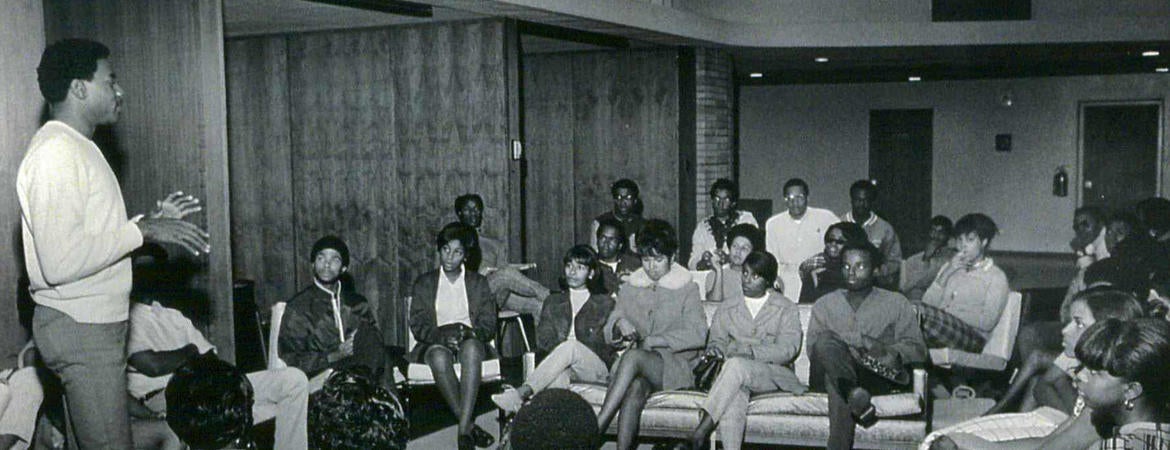College of Humanities, Arts, and Social Sciences

African-American history and its study has been a cornerstone at UC Riverside since the 1960s. The Black Studies major was created in 1969, when a group of 60 students, led by Charles Jenkins, decided to further their pursuits for knowledge surrounding African-American culture, according to the website for UCR's African Student Programs. The major dissolved in 1970, transforming into Ethnic Studies.
Black studies emerged in San Francisco State University in 1968 and UC Berkeley in 1969, according to Professor Alisa Bierria, a UCR Ethnic Studies professor. "It happened in the midst of a lot of political movements. You had liberation movements, you had Black Power, you had anti-colonial movements all around the world, women's liberation, gay liberation… And students were a big part of that."
Ethnic Studies has since become an integral part of academia, not only enriching the global knowledge and understanding, but also helping communities where their centers reside. "People have argued that one key purpose of academia is to give back to the community," Bierria said, "not exploit the community for the kinds of knowledges they have for their papers and research."
UCR's Black Studies department became a natural gathering place for students of African descent and, by 1972, became the genesis of what we know as UCR’s African Student Programs office. UCR was the first University of California campus to have a professionally staffed Black student resource center and, in 2017, African Student Programs celebrated its 45th year.
"Over the last 46 years, ASP has been involved in teaching the African American legacy through culturally based programs and events geared toward promoting awareness, education and appreciation of the African and African-American culture," said Rhiannon Little-Surowski, ASP’s current Program Coordinator. Little-Surowski has been with ASP for 12 years, beginning as an undergraduate student. "We further teach the legacy through social justice and diversity trainings campuswide, as well as through our Pan African Theme Hall which is a residence hall in Pentland Hills."
Education about African-American culture extends into the classroom. The late Professor Sterling Stuckey, a pioneer in African-American Studies, came to UCR in 1989 as a history professor specializing in American slavery and African-American culture and history. Even before his arrival at UCR, Stuckey was a prominent scholar in African-American studies. His addition to UCR’s growing team of professors was no small event.
"[Professor Stuckey] put UCR on the map," said Professor Thomas Cogswell, chair of UCR’s Department of History and close friend of Stuckey's.
Scholars from across the nation took Stuckey's research and utilized it as a basis for their own studies, according to Cogswell. Stuckey’s work was important, and that enticed graduate students in the field to study under him.
During the ‘90s, Stuckey went to various Historically Black Colleges and Universities to recruit new graduate students to study and work with him, further bolstering the numbers of Black and African-American graduate students and faculty at UCR. One of these graduate students was Dr. Paulette Brown-Hinds, publisher of Black Voice News, in Riverside.
Black Voice News started in 1972 as a newspaper by a group of African-American students and has been a close partner of UCR and CHASS ever since.
"It was created by students on campus," said Brown-Hinds. "They were inspired by the courses they took in Humanities and Social Science, and created the newspaper. They wanted to take control of their own narrative."
The newspaper, inspired by the struggles of its progenitors, continues to support students on campus as an online news publication and helps promote events by African Student Programs. According to Brown-Hinds, Black Voice News also collaborates with faculty from different UCR departments.
"We've published graduate students and faculty," she said. "We provide a platform for them."
In 2010, Black Voice News collaborated with Professor Stuckey to hold a book signing for his work, Slave Culture: Nationalist Theory & the Foundations of Black America. Brown-Hinds credits the newspaper's relationship with UCR and Professor Stuckey for the ability to tell the story of the African-American community.
For more information about UCR’s Department of Ethnic Studies, visit ethnicstudies.ucr.edu. For more information about Black Voice News, visit blackvoicenews.com.
Photo courtesy of African Student Programs